
Online Reputation Repair: White Hat SEO Guide
First, thank you for actually clicking the link that caused you to land on this page. But why should you spend any of your time reading this article? Why should you not bounce right off this page? Here's why. You've probably noticed that everything in digital marketing is consolidating and each area needs to start working together as part of the big picture.
So after you've done your SEO, PPC, Social Media and Content Marketing campaigns and successfully onboarded a customer through CRO and your Sales Funnel. Then you retargeted them and got them to spend money. And what is the result of all of your hard work? You've helped a company build a brand and that brand has a reputation. This leads to brand searches, word of mouth marketing and online reviews. If you have checked your analytics lately, you'll probably notice that your top converting traffic is from brand search and referring traffic. Yes, maybe some of the other channels convert on certain keywords, but this is the gold mine.
Who Should Read, Share and Link to This Article?
Maybe you're an SEO looking for the next opportunity or a digital marketer with a client that desperately needs to fix their online reputation. Or maybe you've realized that all of your marketing efforts feel useless because when their potential customers search your client's brand name they just see negative results. Maybe you're just a digital marketer that wants to learn more about this so you can protect your online reputation. Maybe you wrote an article about ORM and it's time to update it with higher quality information and resources.
This article is NOT for businesses with a reputation repair problem! This guide will be way too technical. Instead read our "How to Repair a Bad Online Reputation" guide for businesses.
Later on, I'll show you a few examples of reputation repair campaigns, but for right now let's cover the basics.
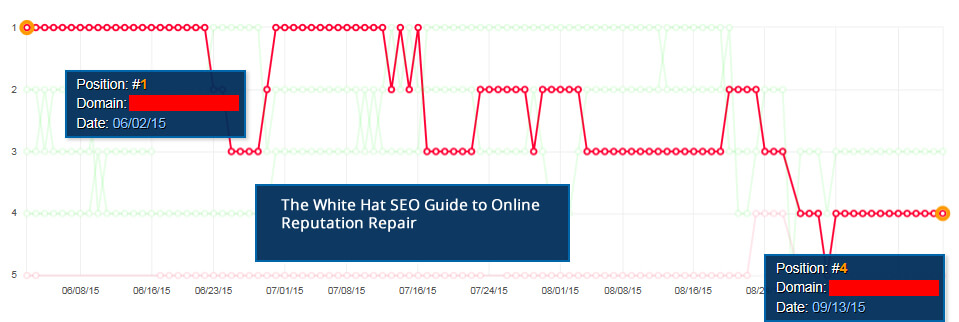
Reputation Repair
Why should you read this article?
Because chances are you've tried to find information about online reputation management and repair and kept finding tips for businesses with the problem, NOT tips for marketers. Let's be honest, most of the information is so generic that you couldn't possibly do anything to help your clients let alone charge them for it and say that you provided any meaningful value.
As you read this article, you're going to pick up some nuggets that you're not going to find in other places. The fact is that most of the articles written about ORM are from people that have never actually run a campaign.
The Problem: Your Client Has Negative Search Results
For whatever reason your client has negative search results. Sometimes it's because they did something illegal or questionable. Sometimes, people just have it out for them. For example, some publishing companies intentionally tell their staff to write a controversial piece.
Complaint sites like RipoffReport.com have also started popping up. Whether the reviews are legit or moderated; it doesn't matter. Whether they take advantage of people and extort them is a whole different story, but the main problem is that your client is losing business.
This article will cover:
- What is online reputation management?
- Who is a good candidate?
- How to launch a campaign
- Measuring success
To avoid getting sidetracked, we can't talk about everything.
This article will NOT cover:
- How to monitor or improve your already positive online reputation
- How to respond to anonymous complaints on review or social media websites
- How to file a defamation lawsuit
- How to get PR
What is Online Reputation Management (ORM) and How is it Different From Online Reputation Repair?
Think of monitoring as watching for social mentions and publications including your brand name. Management is the response you take to handle both positive and negative press and your pre-emptive strike to prevent any small problems from becoming big ones. Repair is for when crap hits the fan.
Most businesses are able to moderate forums and review sites, but it gets really bad when a negative piece of content starts ranking for the brand name. No longer is the issue isolated to one platform where it will likely become "yesterday's news". Instead it's visible in search engines and is consistently there when anyone searches for the company.
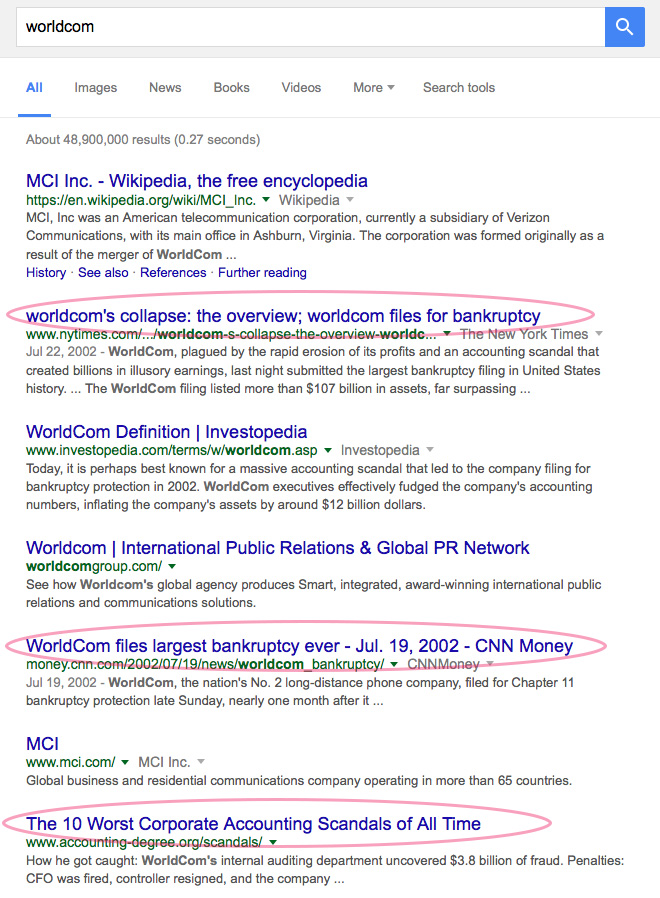
WordCom Negative ORM search results
Just like when SEO became popular, a lot of people called it BS because they didn't really understand it. The same thing can be said about ORM. Yup, lots of people buying the services have already been burned, but ORM and SEO are very different.
Here Are Some Important, But Generic Tips
What I tried to do is digest all of the other guides offering generic tips into this. Just bear with me as we make sure everyone is on the same page. One thing you need to understand is there are many different types of online reputation management.
This article isn't about making an already good reputation better, monitoring your existing reputation or using social media. We're not here to talk about dealing with one star Yelp or Google+ reviews. This article also isn't about social media blowups stories or the great customer service someone received after messaging a social media account.
This article is about fixing negative search results.
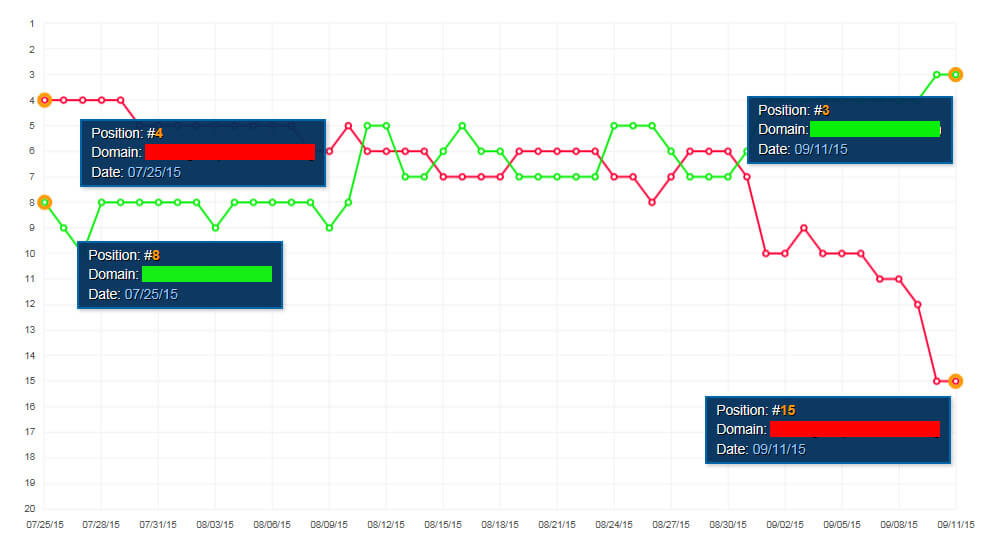
Reputation Management
The first thing to ask, "Is this content defamation?" – if this is the case, you should consult an attorney before taking any action. However, if the information is truthful or falls under free speech then legal action may not be the best course.
You should consider contacting the offending party to see if a resolution can be made. In the event of a DWI, SEC filing or Public Relations piece there is often nothing that can be done. However, sometimes an agreement with an individual can be reached. Yes, sometimes this means paying to make the problem go away. Call it extortion, but this is often a lot less expensive than promoting content to the top of the search engines to suppress the negative results.
Who is a Good Candidate for Online Reputation Repair?
As much as everyone thinks their own name is really important, there is often little or no search volume around an individual's name. Most of the volume is around a company's name. Unless your client is a high-profile individual, their personal search only matters when someone is researching their company for a potential deal.
With the way that Google currently works the average person can't afford to repair their own reputation and the results that the typical agency can deliver aren't going to make an impactful difference relative to the cost. As a result, large businesses and high-profile individuals are the best candidates.
What Is the Difference Between Reputation Repair and SEO?
As good as you think you might be at search engine optimization, reputation repair is a whole different animal. Yes, it takes into consideration some aspects of SEO, but here is how search engine optimization is different from reputation repair.
With SEO, you are oftentimes asked to optimize onpage content and earn backlinks for just one website. It's pretty easy to become familiar with one website that you control and update. What ORM clients are asking you to do is "Please rank ten pages for this result" instead of just the one you are used to.
Let's say the offending article is in position #2. Now the demand is not only get 10 pieces of content onto the first page, but rank 10 pieces of content into the #2 slot. You might be thinking, some of these people don't have much competition for their name, so I'll just build some web 2.0 properties and get some links to them. Unfortunately, this isn't the way that it works. Usually the offending piece of content is on a domain with lots of authority and your Tumblr subdomain article isn't going to be enough to outrank it.
Setting Client Expectations
Just like with SEO, you need to set expectations correctly. Most clients understand that this negative piece of content is somehow hurting their reputation and sales. But for the most part, they have no idea how much. Just like SEO, anyone that wants you to guarantee results is crazy. You don't control Google!
Most clients underestimate how much damage a negative result does in the #1, 2 and 3 spots, but overestimate how much it does in spots #4-10. Some clients even ask for you to clear the second page, but don't really understand what that means.
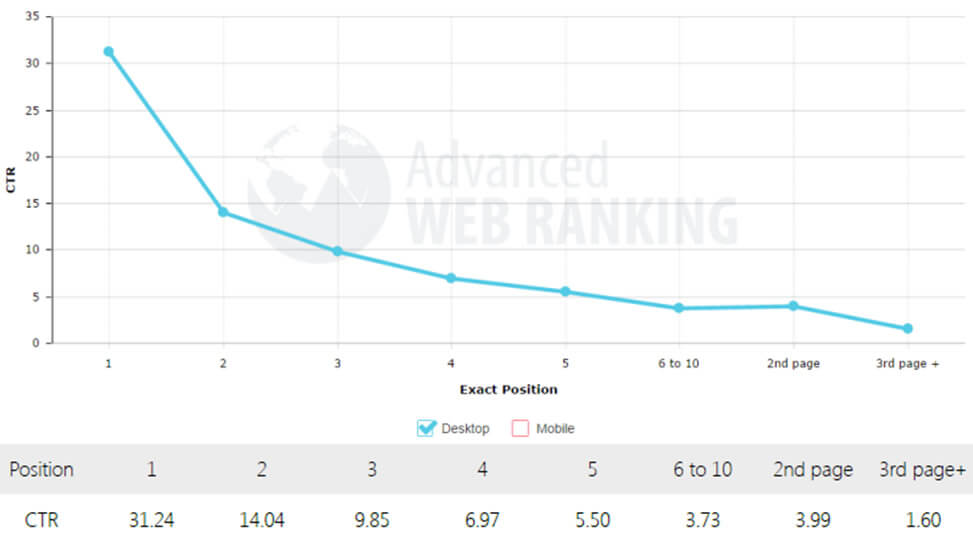
Click Thru Rate
Here is a case study done by Advanced Web Rankings on Marketing Land that shows Desktop searches get the following CTR. The biggest returns are moving a negative out of the first 3 spots and then from spot 10 to 11. What this study doesn't consider is that some visitors are going to click multiple results during the research stage.
Another thing that clients don't understand is sometimes someone really has it out for them. You absolutely need to check if someone is also optimizing for the same keywords. When someone else is intentionally optimizing a negative result offpage, it usually isn't a battle worth fighting for small businesses. The fact is you are going to have to spend 10x what that person is spending, which honestly isn't affordable for most businesses.
When trying to sign a new client if they string you along, they are just milking you for your knowledge or just don't have the budget. Either way they are going to be a pain in the butt. Have you ever noticed how the pickiest clients want to pay the least? As a note, if the business actually cares about their brand they'll also be making internal changes to improve their customer experience.
How to Launch a Campaign
What most SEOs underestimate is the cost and the time involved. You really need to understand the websites that you are competing against. What is the offpage strength of the domain and page, what is the quality of the content on the page and what anchors are being used offpage?
The easiest tool to check the offpage signals with is Majestic. Use the Backlinks and Anchor Text tabs to get a much clearer picture. This will help you determine if the incoming links are strong or if they are mostly spam. (Jacob is a brand ambassador for Majestic and his opinions do not reflect the official opinions of Majestic).
Be sure to check if the negative results are located on a niche relevant website, news site or on a geo-location relevant website as they will be harder to bury. Also don’t launch a campaign if more negative press is coming out. Once you have a good idea of what you’re going up against it’s time to start your campaign.
The first thing you are going to do is launch a PPC campaign for their brand name and other related searches. Yes, you want to eat up the first result with an advertisement. But make sure it's a sitelinks advertisement featuring multiple pages. Notice how Bing runs Ads even above their organic listing.
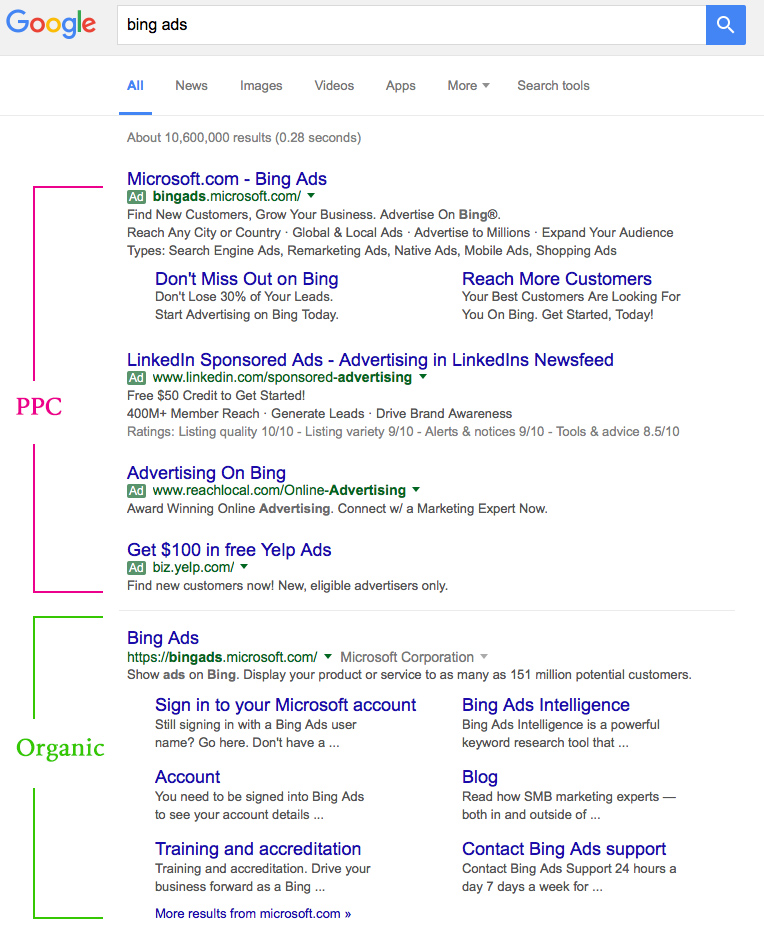
Brand Ads at the top of search results
For the average client, unless something really bad has happened, then they should at least own the #1 spot for their brand name. This might not always be the case for words like reviews and scam. Another request you're going to get from clients is to create Sitelinks. These usually happen automatically and there is no magical formula. The best known tip is to have clearly defined navigation on the website.
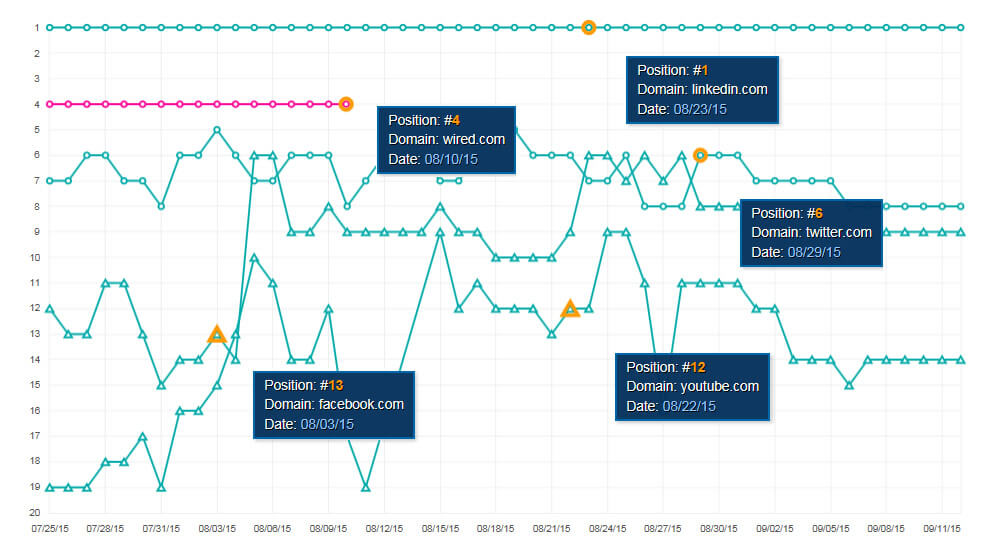
Social Properties
The next logical step is to rank social media properties and existing content pieces. Here's the truth, unless they have an active social media account, it's going to be more difficult to rank than you think. They definitely need to get started on Twitter and LinkedIn. These are properties for the most part that you can control.
LinkedIn is good for individuals because you can add a lot of content. Twitter is also good for businesses, as it's easy to link to in your signature from different publications. Facebook is usually a good opportunity for businesses, but doesn't always rank well for individuals. Yes, definitely link off the main website to the primary social profiles and have the social profiles link back to the main website. Yes, use structured data and the sameAs tag.
Did you know? The most powerful link most Facebook pages have is from the main website's footer. Normal behavior isn't to link to Facebook, it's to share and like.
Reputation Rank Tracking
The ORM rank tracker is a unique feature of SERPwoo, here is more information on tracking and monitoring.
At this point if everything went well your campaign results might look like this, however, sometimes there are multiple negative results, not enough social properties or directories and it's time to create more content. You should have a pretty good estimate of this even before you launch your campaign. Yes, even when you cleared the first page, it doesn't always mean that your job is done because the negative result can swing up and down. You may need to charge your clients a maintenance fee.
The Best Content Wins
The most important thing to understand is the best promoted, most engaging, relevant content, whether positive or negative, on the most topically relevant, authority website always wins. So creating a ton of crappy business profiles usually isn't the solution because that isn't what most people want to find when they search. Be sure to assess the quality of the negative content because you will need to create content that is better than the most engaging negative result. Also avoid clicking on the negative results during research!
Yes, creating awesome content is expensive! And getting placement on a good site can also be expensive. Most businesses can't afford to spend or aren't willing to spend $2,000 produce a piece of content and $2,000 for the effort required to get placement. However, this is what it takes for national terms. For local businesses, it's often about getting Public Relations pieces created in local newspapers. SEOs, PR does not mean Press Releases. While these used to work in the past, they just don't stick on the first page. Yes, it's a battle to get PR for a business, especially if they aren't deserving of it. It's also uncommon to get a full feature for your client that has optimized title tags.
A common trap is making a website called brandnamereviews.com and having non-engaging or corporate content on the site. This will consistently fail to outrank the top complaint or affiliate comparison site unless it has awesome content on it!
To avoid getting too tactical, whatever you need to do to get quality links to this new piece is going to work. There are plenty of guides that talk about link building. The algorithm is always changing so what worked yesterday doesn't always work today. So rather than writing a giant guide, just search Google. In general, reputation repair will keep getting more expensive and you will most likely need to spend several thousand dollars promoting each property. Don't be afraid to use your other marketing channels to increase the popularity of this piece. Yes, link from your client's website, email the list, buy PPC traffic to it, post it to social, retarget your customers to this page. Yes, create good, user signals.
Measuring Success
Let's say that you were able to move down a negative search result from #2 to #3. That means the expected amount of traffic going to the page maybe dropped from 12% to 8%. That's a 33% decrease which is HUGE, however the client still sees the result at #3 and thinks you didn't do anything meaningful. Or even a change from #1 to #2 is a drop from 42% to 8% which is a traffic reduction of 80%.
So see the problem, you probably decreased clicks by 80% or more, but visibility is still close to 100%. And yes, from an ROI perspective if you spent 80% of the budget accomplishing this it would be OK, however, chances are you can't fix the remaining results with 20% of the budget, which is only going to solve 20% of the problem. This is what I mean by diminishing returns.
Also customers don't always understand that algorithms change and those negative results can move up. Especially those with clickbait title tags that deliver excellent content.
Dealing With Client's That Don't Pay
For the most part, the businesses you are going to encounter are good businesses where someone made a mistake. I completely agree that because someone made one mistake many years ago and they corrected the problem doesn't mean their business should be destroyed by it. This doesn't mean this should be erased from their history, but one customer's bad experience may be reflective of 1% of all the customers the business has served. The largest problem is most of the negatives aren't an aggregate review and are just one person's opinion. Even worse, some are from rogue, former affiliates.
Some client's aren't going to pay and these are the client's you probably shouldn't have signed anyways. They are just trying to keep the lights on and usually they've done something pretty bad. Chances are they should have re-branded. If a client doesn't pay, you should stop your efforts and if the positive pages decrease in rankings that is just part of the business. But NEVER intentionally boost the rankings of the negative! Don't do it as a way to get revenge, just cut your losses and move on.
When Is It Time to Call It Quits?

Just like with SEO, you can't always win every battle. With reputation repair you're typically trying to get more than 10 articles onto the first page; however you usually aren't charging 10 times the price.
After 3 months if you aren't seeing traction, it's time to look at gracefully ending the contract with the client.
However, sometimes it might take as long as 6 to 12 months to completely clear a client's results and even longer if they have a limited budget. Always ask your client to let you know if they anticipate any new negative press and consider calling it quits if negative content repeatedly continues to surface.

Reputation SEO
Just like how most SEOs can't deliver top 10 results, most repair campaigns will never completely clear the first page of all negative results. This is normal! Just make sure that expectation is set up front. So if a campaign results in only moving a negative from #2 to #5 don't beat yourself up. Remember, it is also hard to build your brand doing reputation repair because you can't generate testimonials or put their company logo on your website.
Summary
Now that you know more about online reputation repair, remember these 3 tips:
- The Best Content Always Wins
- Always Set Proper Client Expectations
- Know When to Call It Quits
Because you learned something valuable from this article, please link to it in your next great piece of content and share it with an influencer on Twitter.
Other articles Jacob has written that might interest you include:
5 Ways Successful SEOs Are Killing It With Topical Trust Flow and How to Identify Quick-Wins Through Onsite SEO.
Similar Posts On SERPWoo
- How To Do Monthly ORM Reporting (Online Reputation Management)
- Push Down Negative Websites Just Like Expensive ORM Professionals
- How I use Serpwoo.com To Manage Online Reputation Clients
- Online Reputation Management Strategy Tools
